- Home
- Steven Becker
Storm Clouds Page 16
Storm Clouds Read online
Page 16
The driver introduced himself as Assam and led them across the four-lane approach to a parking lot. Finally they reached a dirty white car parked alongside an entire row of similar vehicles.
“Where can we go to make sure no one is following us?” Mako asked the driver once they were inside.
“Ah, busy tourist place? Find something for the nice lady?”
“Sure.” Mako only cared about the busy part.
“The bazaar, then.” The car shuddered as he accelerated.
Horns blared as the taxi merged into traffic. In minutes, Mako had no idea where he was. The city all looked the same from the main road until they exited and found themselves in a quiet neighborhood.
“It is the City of the Dead,” the driver told them.
“They’re all mausoleums,” Gretchen said.
Mako had at first thought they were in a strange, eclectic neighborhood, but now realized they were in a kind of living cemetery. “People are living here?” He noticed the pedestrian traffic was similar to most neighborhoods. He saw people entering different mausoleums, some with bags of groceries. They passed several open gates where laundry hung, and there were thin streams of smoke, where residents squatted around what must have been cooking fires.
“These people live here. Most are allowed by the families who own the tombs to guard against the squatters.”
The area seemed to go on for miles until they turned onto a narrow, winding street where the pedestrian traffic seemed to converge.
“The bazaar. I will circle. Here is my number when you are ready.” The man handed Mako a crumpled card.
“We have no phone.”
“You can get one there.” The man pointed to a storefront on the left.
“One hour. Back here.” Mako wasn’t taking chances.
Mako and Gretchen got out of the cab and stepped onto the busy sidewalk. The first thing Mako noticed was that not one inch of space was vacant. Every crack and crevice, alley, and alcove held someone trying to sell something.
“Don’t make eye contact,” Gretchen warned.
It was too late, as several vendors descended on them. Mako finally brushed them off and entered the electronics store. A few minutes later, they emerged with a burner phone.
“I need some food. Then we can call Alicia.” Mako was set on bringing her into this.
“Better get some local pounds. They’ll remember the American handing out dollars,” Gretchen said. She led the way, browsing the goods that ranged from souvenir trinkets to exotic teas and local food venders. The aroma was overpowering. Finally, off the main drag they saw a sign for a bank.
The “bank” was three ATMs packed tightly beside each other. Two were in use. Mako stepped up to the vacant one and inserted John’s credit card. The menu offered an English option and was straightforward enough. A long minute later the machine rumbled and produced a stack of cash. Mako pocketed it without counting and started another transaction.
“What are you doing?”
“It’s got a five-thousand pound limit. Three hundred bucks.”
The machine beeped several times then spat the card back. Mako turned, one hand full of cash and the other clutching the card, to see two men approaching. They looked ominous and were built like linebackers. He quickly stuffed the bills and card in his pockets. As they got closer, their eyes shifted toward him. Mako searched the alley for anything that might help him and Gretchen escape. He couldn’t take them out without a gun.
A group of tourists crossed the street. One carried a souvenir bullwhip. Mako was just about to reach for the weapon when the men brushed past him. They continued to talk as they approached the ATM.
Mako breathed out in relief.
“Not going back to that well,” Mako said, stepping back onto the sidewalk.
“It’s enough to eat on. We’ll deal with needing cash later,” Gretchen said.
Mako knew he was on the edge of hangry and tried to relax. He breathed in deeply as he followed Gretchen back onto the main street, and in the process inhaled the enticing melding of flavors.
What he wanted was a burger. What he got he couldn’t pronounce, but it appeared to be some sort of chicken dish. They ate quickly, watching the street for any sign of interest in them. Several kids approached, but they were just looking for handouts. A few minutes later, and ten minutes before their scheduled pickup time, they were walking back to the street where Assam had dropped them off.
They were both relieved to see the beat-up cab waiting and climbed in.
“Where to now? You want to see Garbage City or the Citadel?”
“Just drive,” Mako said, as he opened the package and took out the burner phone. He turned to Gretchen and smiled. “I think we’re good. Glad I didn't have to Indiana Jones it back there.”
28
Key Largo, Florida
Alicia and TJ had been at work since John called, trying to generate the location of the cache from the map they had downloaded from Mako’s phone. Their original task of creating a facsimile capable of fooling John's abductors had been fairly straightforward. The project had changed with John’s escape and was now a complex mapping job with the intent of finding the cache instead of leading someone away from it.
The desert appeared to be a static environment, but it wasn’t. Its ever-expanding boundaries and frequent sandstorms changed its contours regularly. The Sahara covered a vast area—larger than the continental US. The part of the Great Sand Sea within Egypt was as large as the American Southeastern states. The main features were unique and identifiable, but only small areas were mapped with any degree of detail.
Google Earth showed surprisingly good resolution. From above, the terrain looked very different than at ground level. The spines of long-lost mountain ranges poked through the sand, and clearly visible were the remains of old rivers and streams, showing that, at one time, the desert had been green—as recently as 5,000 years ago. It proved that global warming was not a recent phenomenon.
But street-level detail was missing. Alicia had accessed every government agency she could think of, but their maps were no better. Without the ability to direct a satellite to do her bidding, they would have to work through it.
This kind of work fell clearly into TJ’s wheelhouse. He started by eliminating as much of the area as possible. The ancient Egyptian empire had spanned most of the Middle East and Northern Africa at various times, and knowing its boundaries around the time of Nefertiti was critical. He assigned that task to Alicia.
Within minutes she had two maps overlaid on one of the screens. One showed the extent of the Egyptian empire during the 18th Dynasty and the other displayed the current map. To the east, the border with Libya remained the same, as did the northern border delineated by the Mediterranean Sea. The western borders extended into the Sinai Peninsula and Syria. To the south, the empire encompassed all of present-day Sudan, known then as the Empire of Kush, and reached to the borders of Ethiopia, then known as Punt, which had been under their influence.
“That’s a lot of area, but I think we need to focus around Luxor, which was then the capital, called Thebes.”
“Makes sense.” Alicia zoomed in on a much smaller area around the horseshoe-shaped bend in the Nile.
“Let’s focus on this area.” TJ drew a circle around the bend and the area within it. Neither was surprised that the Valley of the Kings lay inside it.
“I’m no geologist, but I would venture that area was all green back in the day.”
“Interesting.” Alicia was reading an article on her screen. “The burial sites were all west of the Nile to be closer to the setting sun.”
“So if there’s a missing tomb, it’s in this area.”
Alicia ran her mouse up and down the screen creating a box. “It’s almost a thousand square miles.”
“Yeah, there’s that. But their entire culture was based around that river. The ancients knew with pretty good precision when it was going to flood and planted their c
rops accordingly. They would have also noted the erosion from the waters receding over the years. Anything’s buried there, it’s on higher ground.”
Alicia studied the topography. “Makes sense. The Valley of the Kings is all well above sea level. I would guess they worked within the confines of that elevation.”
“Right.” TJ sipped his Coke while a topographical map loaded. “We just need a datum point.”
“I missed taking geology.”
“A reference point.” He moved the mouse over the main portion of the valley. “This is at 180 … meters, I would guess. Most of the tombs are in and around that elevation. Now you can see …” He moved the pointer to a band of narrow lines. “It rises to a height of 280 meters at the top of these cliffs, then drops. If we put a search area of 150 to 300 in …” He started typing. “It’ll show the elevations they most likely—”
TJ stopped at the sudden snap of shattering wood. He and Alicia turned toward it. The solid-core double doors to the War Room were closed to keep out the outside light and provided additional insulation, allowing the War Room’s dedicated air-conditioning system to keep the subtropical climate at bay.
They heard an even louder sound that could only mean the front door was being breached.
“The Vault. Do it,” Alicia said.
TJ executed the massive data dump that would immediately backup all the information on their local servers to a secure portal in the cloud. Once the data was sent, the drives were automatically wiped. It would take an expert months to get anything off them.
“Done,” TJ said.
The doors flew open and sunlight poured into the room, outlining a man with a pistol pointed at them. Their enemies had sent people against them once before, but neither Alicia nor TJ had expected it today. Unless TJ could obliterate them with his mouse, they were defenseless.
“Leave your phones and watches and you—step away from the desk.” The man swung the barrel toward Alicia.
Alicia raised her hands and stood. The barrel tracked toward TJ. “And out of the chair. We’re going for a boat ride.”
Alicia began mentally processing information. Her past training wasn’t needed to tell her this was not going to end well. The Florida Keys was not a high-crime neighborhood. They had no security system and were totally unprepared for a home invasion. As she studied the man holding them at gunpoint, she thought about her unlikely mentor in the small amount of field work she had been exposed to. What would Trufante do?
Alan Trufante, known as Tru—among many other names to his friends and enemies—had taught her more in two days than the Agency had in five years. The man was an outlier, though, staying alive by his natural instincts. Even so, with every move they made going forward, she would try and think like the wily Cajun.
The first step, wiping the drives, was complete. She and TJ might not have been prepared for an armed invasion, but they were for a data breach. They worked through a network of disassociated servers to hide any electronic breadcrumbs. Each job was isolated and contained in an encrypted folder that on any threat was sent to a remote server they had nicknamed The Vault. It was so remote and encrypted that even if they were subject to torture, the information revealed wouldn’t compromise them.
Alarms were tripped whenever someone tried to access their files. Some were triggered by random algorithms set up by hackers searching for particular search phrases. These were the data miners, hoping for the one-in-a-billion shot at something valuable. The odds meant little to them, as their automated servers worked 24/7 with or without an active presence. These kinds of hits were easily avoided or re-routed.
The larger threat was from people like themselves. Computer nerds are a peculiar breed. Their skills are similar, but their moral compasses differed. Given unlimited time and even minimal resources, a dedicated hacker bent on accessing a system was likely to succeed.
Layer on layer of redundancies had kept their data safe so far, and with her quick thinking and TJ’s fast fingers there was no trace of anything Egypt-related on their local drives. It had all been shipped to The Vault.
The man waved the barrel of the rifle at the doors. “Out.”
Alicia and TJ glanced at each other and followed his orders. Once they were in the living area, he moved behind them and prodded them toward the shattered entry door. He guided them down the stairs and toward the dock.
“Go on.” He motioned them aboard their boat.
Alicia looked back at TJ. She knew once they boarded, their options were limited. What she couldn’t figure out was why this was happening.
The reason quickly became apparent when she saw two men and a woman with messenger bags slung over their shoulders and coffee cups in their hands, the universal uniform of computer geeks, head upstairs. At that point she knew their captor thought she and TJ were expendable.
Their only chance was that the man would wait until the hackers confirmed access to their files before killing them. Knowing that call was not coming gave her little comfort.
TJ had zero field training, but he was a skilled captain and proven under fire, after guiding their friend Mac Travis past an angry Cuban naval bombardment as they escaped Havana’s harbor. That had happened several years ago, and the Key’s lifestyle showed on TJ’s physique. Alicia was still fit, but it had been years since she had practiced her martial arts. Neither posed a physical threat.
As she stepped aboard, Alicia scanned the deck looking for any kind of weapon. They carried a speargun with a 12-gauge powerhead to ward off sharks. The gun seemed to always be in the wrong place at the wrong time and had sat in its rack for over a year. She had no idea if there were even shells aboard.
Sharks were common sights on their dives, but rarely caused any issues. Even when the predators were in evidence, with the exception of their interest in the spearfishermen’s stringers, they rarely caused problems for divers. In place of the speargun, they had adopted shark repellant bands, which generated a continuous low voltage charge that discouraged the sharks. The dozen bands hanging from a bar mounted in the cabin were of no help with this human predator.
“Don’t know what you’ve got planned, but the boat is low on fuel,” TJ said.
Alicia didn’t know if TJ was trying to buy some time or had a plan. “Those are full.” She pointed to the yellow plastic containers sitting on the dock. What looked like a chore to fill the tanks was actually not. By using the ten-gallon jugs, they not only saved a dollar a gallon over marina fuel, but didn’t have to waste hours at a fuel dock. Most of their charters were less than thirty miles and running at twenty knots the burn rate was less than a gallon per mile. When four or five of the ten tanks sitting on the deck were empty, it entailed a quick trip to the gas station, instead of waiting hours at a busy fuel dock.
The man nodded. TJ hopped off and carried the jugs to the edge of the dock. Alicia loaded them aboard the boat and started to secure them.
“Both of you, on the bridge where I can see you.”
Waiting for TJ to climb the ladder to the upper deck, Alicia mentally scanned the various distress signals aboard. The airhorn and flares, unless they could be used as weapons, were useless unless the boat was stopped. An EPIRB was located in a cradle by the door to the cabin. Activated by water, it needed to be tossed overboard, at which point it would send a distress signal to the Coast Guard. The device was invaluable if the boat were sinking, but with all the false alarms inherent with the devices, the Coast Guard would ignore it if the boat was underway.
Many divers had started to use PLBs, or personal locator beacons, in case they became separated from their boats. Useful for recreational craft, they were not often seen aboard commercial boats.
With multiple scenarios spinning through her brain, Alicia followed TJ up the ladder. They reached the bridge and waited while the man below dropped the lines and hurried up to the helm.
As he reached the bridge, he pivoted the rifle, held to his chest by a sling, into his hands and aimed at TJ. “
Drive us out of here.”
The big diesels fired up and with no options available, TJ idled out of the canal. TJ had chosen the location for the shop and boat for its proximity to both US 1 and the Atlantic. Most days it was an advantage, but today they were quickly through the quarter mile of canals and staring at open water.
“Divers, eh?” The man called out over the throaty engines. He smiled.
Alicia’s stomach churned, but neither she nor TJ reacted.
“Could be worse ways to go.” The man reached over and pushed down the throttles.
They were headed for open water.
29
Cairo, Egypt
Mako and Gretchen had left the bazaar. Crammed in the back of the small cab with Assam at the wheel, they were now on the outskirts of Cairo. To Mako’s surprise, the great pyramids appeared on their left. Shrouded by dust from the desert and the pollution of the city, the three testaments to ancient Egypt appeared surreal. Mako had no idea they were actually in the city. Just across the street were the typical brick apartment buildings. It was almost like passing a theme park on I-4 in Florida.
“Where are we?” Mako asked.
“Giza, right? You told me to drive. Might as well see the sights, yes?”
Mako hadn’t been paying attention to the scenery. He and Gretchen had been deep in a whispered discussion.
“Is the phone charged?” Mako asked.
Assam handed it back to him. Mako entered “01” for the US and then Alicia’s cell number from memory. Surprisingly, there was no answer. He checked his watch and subtracted the seven-hour time difference. It would be early morning in Florida. She should have answered. The caller ID would have displayed an unfamiliar number, but it should have also displayed the origin of the call. Mako left a voicemail so she would know the number was his.

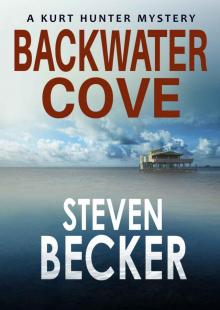 Backwater Cove
Backwater Cove Storm Surge: A Fast Paced International Adventure Thriller (Storm Thriller Series Book 3)
Storm Surge: A Fast Paced International Adventure Thriller (Storm Thriller Series Book 3)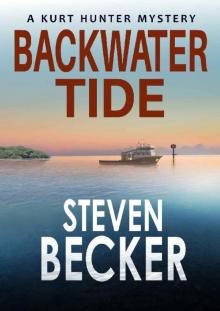 Backwater Tide
Backwater Tide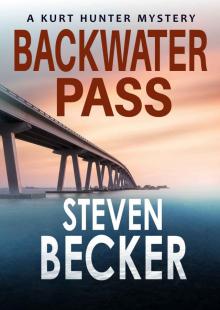 Backwater Pass
Backwater Pass Backwater Flats
Backwater Flats Wood's Revenge
Wood's Revenge Haitian Gold
Haitian Gold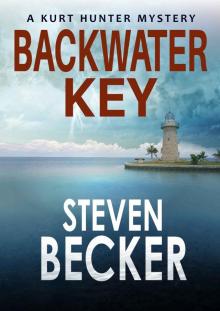 Backwater Key
Backwater Key Wood's Tempest
Wood's Tempest Uncharted Waters
Uncharted Waters Tuna Tango
Tuna Tango The Wreck of the Ten Sail
The Wreck of the Ten Sail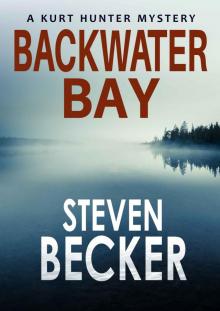 Backwater Bay (Kurt Hunter Mysteries Book 1)
Backwater Bay (Kurt Hunter Mysteries Book 1) Storm Clouds
Storm Clouds Wood's Wall
Wood's Wall Wood's Reach
Wood's Reach Wood's Fury
Wood's Fury Storm Rising
Storm Rising Bonefish Blues
Bonefish Blues Wood's Harbor: Action & Sea Adventure in the Florida Keys (Mac Travis Adventures Book 5)
Wood's Harbor: Action & Sea Adventure in the Florida Keys (Mac Travis Adventures Book 5) Wood's Reach: Action & Sea Adventure in the Florida Keys (Mac Travis Adventures Book 6)
Wood's Reach: Action & Sea Adventure in the Florida Keys (Mac Travis Adventures Book 6) Wood's Wreck
Wood's Wreck Wood's Harbor
Wood's Harbor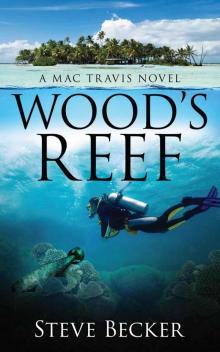 Wood's Reef
Wood's Reef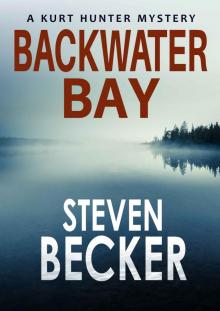 Backwater Bay
Backwater Bay